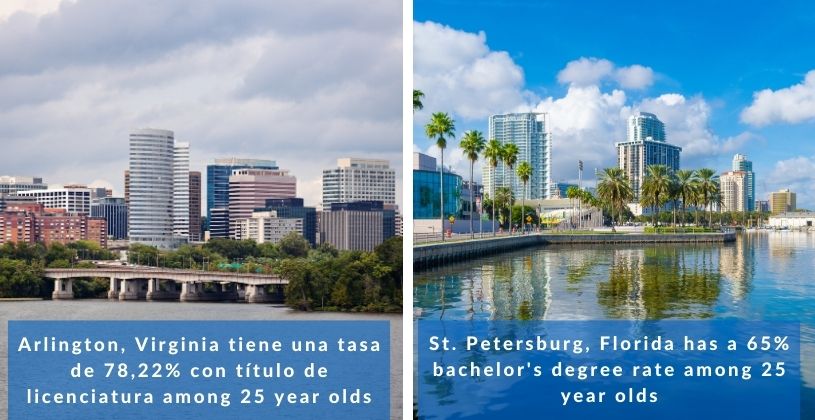In the United States, cities with the most educated populations stand out not only for their high academic levels but also for their ability to generate innovation and attract investment. This is no coincidence, as individuals with higher levels of education tend to earn better salaries, creating a positive cycle of socioeconomic development.
Moving to cities with a solid educational base provides better job opportunities, access to innovations, and a more competitive environment. Contact USAFIS for information on how to relocate.
According to the Bureau of Labor Statistics (BLS), workers with a bachelor’s degree earn significantly more than those with only a high school diploma. On average, the weekly wage difference is $594, making the most educated cities hubs for talent and economic opportunities. These cities are attractive to those seeking higher-paying jobs and companies that need qualified professionals to drive their growth.
Among the top cities, Arlington, Virginia, leads with 78.22% of its residents over 25 holding a bachelor’s degree. This makes the city a magnet for technology and government companies. Close behind is St. Petersburg, Florida, where over 65% of adults have a bachelor’s degree and nearly 39% hold a postgraduate degree.
On the other hand, Atlanta is not only a financial and technological hub, but also an educational reference, with a graduation rate of 59.28%. However, a significant racial gap (-22.32%) in degree attainment highlights the equity challenges that many cities still face.

Reno, Nevada, stands out as an emerging educational center in the western part of the country, with 61.39% of its adult population holding a bachelor’s degree despite a high dropout rate.
San Antonio, Texas, is notable for its colonial architecture and diversity and for having one of the most minor higher education gaps, with a difference of just -5.49% among its racial groups.
In summary, the most educated U.S. cities are not only forging the future through innovation and job creation, but also presenting challenges in terms of equity and educational accessibility. As these cities continue to grow, they set the pace for the country’s economy and social development.
Living in cities with high educational levels facilitates access to quality resources and increases the chances of success in specialized and well-paying job markets. USAFIS can guide you regarding your options for immigrating to the United States.



